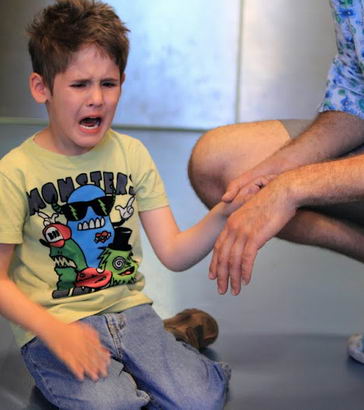
The DfE's Green Paper Support and Aspiration: A new approach
to special educational needs and disability, published in March 2011, emphasises the importance of effective identification
of SEN and disabilities if children are to thrive, be ready for school, make
good progress in their education and, as adults, live independently and make as positive a contribution to society as
is possible.
Allen, 2011
Early intervention from all the services on which families rely is essential, but the effectiveness of
this support is undermined if it doesn't reflect each family's unique circumstances.
Department for Education, 2011
Sure Start guidance (2002):
A child under four years of age has a disability or special needs if she or he:
(i) is experiencing significant developmental delays, in one or more of the areas of cognitive development, physical development,
communication development, social or emotional development, and adaptive development; or
(ii) has a condition which has a high probability of resulting in developmental delay.
Pinney, 2007
A key issue for all early intervention programmes is the identification and targeting of those behaviours,
skills and capabilities that have the greatest impact on accelerating further development (eg communication skills, problem
solving and help seeking) of independence and well-being. To our knowledge little consideration has been given to identifying
these key or pivotal behaviours in the context of reducing future need for social care.
Emerson et al, 2011
Stress is a condition in which an individual experiences challenges to physical or emotional well-being
that overwhelm their coping capacity. While some experience with manageable stress is important for healthy development, prolonged,
uninterrupted, overwhelming stress can have toxic effects. This type of toxic stress is often associated with childhood abuse
and neglect. In the early years of life when the brain is developing rapidly it is particularly sensitive to environmental
influences. Toxic early life stress (ELS) may induce persistent hyper-sensitivity to
stressors and sensitization of neural circuits and other neurotransmitter systems which process threat information.
Gunnar et al, 2009
In this clip, you will find out more about the effects of early life stress on a child's brain: Stimulating minds and protecting brains (accessed 12.1.12) (Shonkoff, 2011).
[C]ommunity supervision is necessary to ensure that the very preterm child is supported in the important
preschool years and into early school life. Careful developmental assessment and early intervention for evolving impairments
by a doctor aware of the potential sequelae of prematurity are critical to optimal development for the individual child.
Marlow, 2004
As well as the danger of Fetal Alcohol Spectrum Disorder, which is the leading known cause of intellectual
disability in the Western world, prenatal exposure to alcohol has been associated with developmental delays and behavioural
problems. Psychosocial stress during pregnancy has been linked to increased risk for attention deficit hyperactivity disorder,
schizophrenia and social abnormalities.
Allen, 2001

Bailey et al (2005) in a national follow-up of over 2,500 families who had participated in early intervention
programmes for children with disabilities found that parents were very positive about helping their child to learn and looking
after their personal care needs but over a third of families 'often have a difficult time figuring out what to do about my
child's behavior'. This is an aspect of early intervention programmes that may need further development.
McConkey, 2010

Allen, G. (2011) Early Intervention: The next steps. London: Cabinet Office (accessed 12.1.12).
Department for Education (2011) Support and Aspiration: A new approach to special educational needs and disability. Norwich: The Stationery Office (accessed 12.1.12).
Emerson, E., Hatton, C. and Robertson, J. (2011) Prevention and Social Care for Adults with Learning Disabilities. London: London School of Economics and Political Science (accessed 12.1.12).
Gunnar, M.R., Herrera, A. and Hostinar, C.E. (2009) Stress and early brain development, in: Tremblay, R.E., Barr, R.G., Peters, R.DeV. and Boivin, M. (eds) Encyclopedia on Early Childhood Development. Montreal, Quebec: Centre of Excellence for Early Childhood Development (accessed 12.1.12).
Marlow, N. (2004) Neurocognitive outcome after very preterm birth, Archives of Disease in Childhood (Fetal Neonatal Edition), 89, F224-F228 (accessed 12.1.12).
McConkey, R. (2010) Supporting Families with Disabled Young People whose Behaviour Is Severely Challenging: A review of literature. Ulster: University of Ulster/NCH Action for Children (accessed 16.2.12).
Pinney, A. (2007) A Better Start: Children and families with special needs and disabilities in Sure Start Local Programmes. Annesley: DfES Publications (accessed 12.1.12)
Shonkoff, J.P. (2011) Stimulating minds and protecting brains (video). Presentation to NBC News' Education Nation Summit in New York City, 26 September (accessed: 12.1.12).

You might also wish to read around the subject. If you do, the following three resources should prove useful.
Munro, E. (2011) The Munro Review of Child Protection: A child-centred system. London: Department for Education (accessed: 12.1.12).
Odom, S.L. and Wolery, M. (2003) A unified theory of practice in early intervention/early childhood special education: evidence-based practices, Journal of Special Education, 37, 164-173.
Tickell, C. (2011) The Early Years: Foundations for life, health and learning. London: HM Government (accessed 12.1.12).